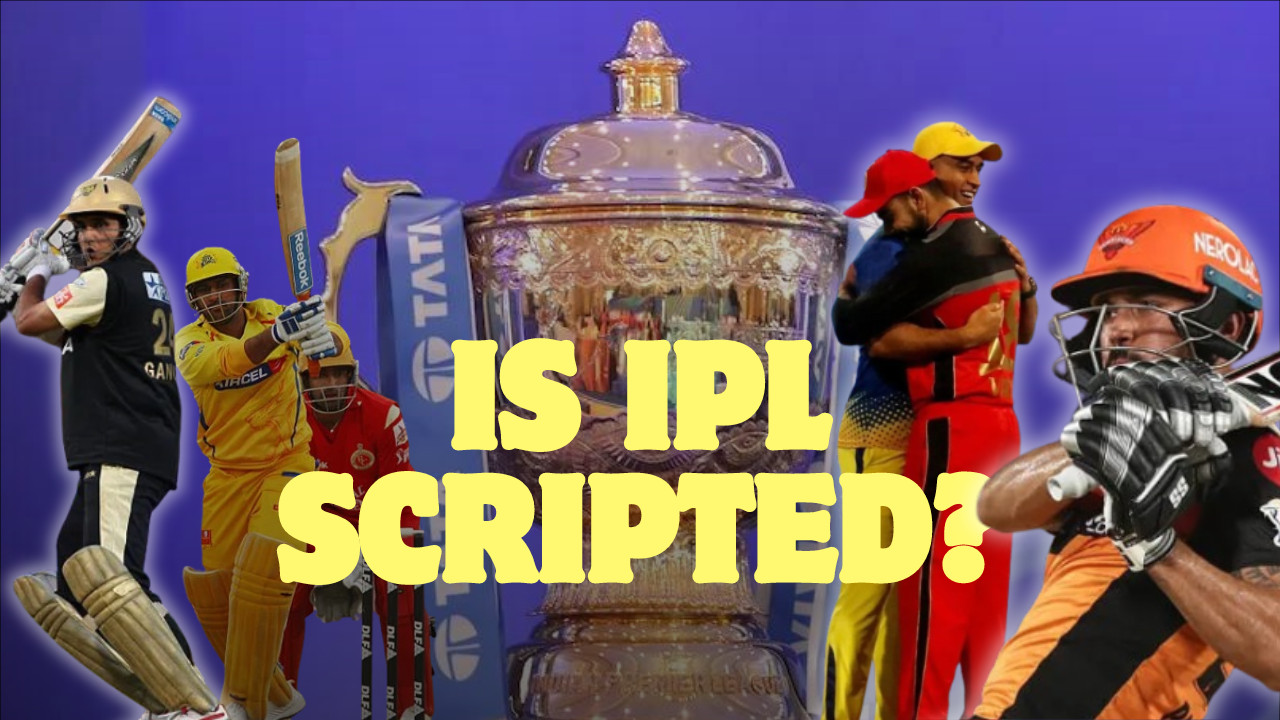Is IPL Scripted? Unveiling the Truth Behind the Controversy
In today’s era of competitive sports, where every move and outcome is scrutinized under a microscope, the integrity of sporting events often comes into question. The Indian Premier League (IPL), hailed as one of the most exhilarating cricket tournaments globally, is not immune to such scrutiny. Among the myriad of discussions surrounding the IPL, one prevailing question echoes persistently: Is the IPL scripted?
Past Scandals and Controversies
Certainly, here are some past scandals and controversies that have rocked the Indian Premier League (IPL), along with samples:
Spot-Fixing Scandal (2013):

One of the most infamous scandals in IPL history occurred in 2013 when three Rajasthan Royals players, including Sreesanth, Ajit Chandila, and Ankeet Chavan, were arrested by the Delhi Police for their involvement in spot-fixing. They were accused of deliberately underperforming in certain overs in exchange for money from bookies. The scandal sent shockwaves across the cricketing world and tarnished the reputation of the IPL. In 2013, three Rajasthan Royals players’ arrests shook the foundation of the IPL due to their alleged involvement in manipulating specific aspects of matches, causing a spot-fixing scandal.
Betting Allegations Against Team Owners:
Over the years, several IPL team owners have faced allegations of involvement in illegal betting activities. In 2013, authorities arrested Gurunath Meiyappan, a high-ranking official of the Chennai Super Kings franchise and son-in-law of the team’s owner, for his alleged involvement in illegal betting syndicates. His arrest raised serious questions about the integrity of IPL team management. Sample: “The arrest of Gurunath Meiyappan in 2013 exposed the dark underbelly of IPL team ownership, as he faced allegations of involvement in illegal betting activities, casting a shadow over the tournament.”
Player Bans for Corruption:

In a bid to crack down on corruption within the league, the IPL has handed out several bans to players found guilty of engaging in corrupt practices. Notable examples include the bans imposed on cricketers like Sreesanth, Ankeet Chavan, and Ajit Chandila following their involvement in the spot-fixing scandal of 2013. These bans served as a stern warning to players about the consequences of compromising the integrity of the game. Sample: “The IPL has taken a tough stance against corruption, with several players receiving bans for their involvement in unethical practices. The bans imposed on players like Sreesanth, Ankeet Chavan, and Ajit Chandila underscore the league’s commitment to maintaining the highest standards of integrity.”
Is IPL Scripted?
Transparency in operations
Transparency in operations is a crucial aspect of maintaining the integrity and credibility of any sports league, including the Indian Premier League (IPL). Here are some examples highlighting transparency in IPL operations:
Player Auction Process:

The IPL conducts annual player auctions, where franchises bid for players to build their teams. IPL officials conduct the entire auction process transparently, providing live broadcasts and updates for fans and stakeholders. They publicly announce each bid placed and player sold, ensuring accountability and fairness throughout the process.
Match Fixtures and Scheduling:

The IPL releases its match fixtures well in advance, allowing teams and fans to plan accordingly. The scheduling process takes into account various factors, including venue availability, team logistics, and broadcasting requirements. By providing clear and detailed information about match timings and venues, the IPL promotes transparency and facilitates fan engagement.
Umpiring Decisions:

Umpiring decisions play a crucial role in cricket matches, and the IPL ensures transparency in this aspect by employing qualified and experienced umpires. These are subject to review through technologies like Decision Review System (DRS) and third-umpire referrals, which are accessible to viewers through live broadcasts. This transparency helps uphold the integrity of match officiating and minimizes controversies.
Financial Disclosures:

The IPL operates with financial transparency, disclosing revenue streams, sponsorship deals, and franchise earnings. Stakeholders gain insights into the financial health and sustainability of the league through publicly available financial reports and disclosures. This transparency fosters trust and accountability among fans, sponsors, and investors.
Anti-Corruption Measures:

The IPL has implemented stringent anti-corruption measures to prevent match-fixing and other unethical practices. These measures include player education programs, surveillance of betting activities, and collaboration with law enforcement agencies. By maintaining transparency in its efforts to combat corruption, the IPL demonstrates its commitment to fair play and integrity.
Is IPL Scripted?
Players involved in match fixing in IPL
While allegations and suspicions of match-fixing have occasionally surfaced in the Indian Premier League (IPL), it’s important to note that not all accusations result in proven guilt. However, notable instances exist where players have faced implications or penalties for their involvement in match-fixing scandals. Here’s a list of players who have had links to match-fixing controversies in the IPL.
Sreesanth:

The Indian fast bowler was one of the central figures in the spot-fixing scandal that rocked the IPL in 2013. The Delhi Police arrested Sreesanth for allegedly conspiring to concede a specific number of runs in exchange for money during an IPL match while he represented the Rajasthan Royals.
Ajit Chandila:

Ajit Chandila, another player from the Rajasthan Royals implicated in the same scandal, faced accusations of spot-fixing alongside Sreesanth. Allegations suggested that Chandila manipulated specific aspects of the game, such as deliberately bowling a predetermined number of wides or no-balls, in pursuit of financial gain.
Ankeet Chavan:

Like his teammates Sreesanth and Chandila, Ankeet Chavan faced allegations of spot-fixing during the 2013 IPL season. Bookies accused the left-arm spinner of intentionally underperforming in exchange for money, tarnishing his cricketing career.
Gurunath Meiyappan:

While not a player himself, Gurunath Meiyappan, a top official of the Chennai Super Kings franchise and son-in-law of team owner N. Srinivasan, embroiled in the IPL betting scandal of 2013, cast a shadow over the franchise when authorities arrested Meiyappan for his alleged involvement in illegal betting activities.
Mohammad Asif:

Pakistani cricketer Mohammad Asif, who previously played for the Delhi Daredevils in the IPL, received a cricket ban for his involvement in the 2010 spot-fixing scandal during Pakistan’s tour of England. Although Asif was not directly implicated in the IPL, his participation in the league drew attention due to his subsequent ban from cricket. Asif’s association with the IPL franchise further fueled concerns about corruption in cricket.
Is IPL Scripted?
Anti-Corruption Measures
The Indian Premier League (IPL) has implemented several robust anti-corruption measures to safeguard the integrity of the tournament and uphold fair play. Here are some sample anti-corruption measures taken by IPL officials:
Player Education Programs:
IPL officials regularly conduct education and awareness programs for players, coaches, team officials, and other stakeholders to enlighten them about the dangers of corruption and illegal betting activities. These programs aim to promote ethical behavior, identify suspicious approaches, and promptly report any instances of wrongdoing. Moreover, they emphasize the importance of integrity and transparency in maintaining the credibility of the league.
Anti-Corruption Code:
The IPL implements a comprehensive Anti-Corruption Code, outlining rules and regulations governing player and official conduct. The code bars players and officials from participating in corruption, such as match-fixing, spot-fixing, or betting on matches.
Surveillance and Monitoring:
IPL officials actively utilize advanced surveillance and monitoring techniques to identify any suspicious activities concerning betting or match-fixing. This involves monitoring betting patterns, tracking communications between players and bookies, and conducting undercover operations to pinpoint potential threats to the integrity of the tournament. Moreover, they employ cutting-edge technology to enhance their surveillance capabilities, ensuring prompt detection and response to any irregularities. Additionally, they collaborate closely with law enforcement agencies to share information and coordinate investigations into suspected cases of corruption. Through proactive measures and diligent monitoring, IPL officials strive to maintain the integrity and fairness of the tournament, thereby safeguarding the trust and confidence of stakeholders and fans alike.
Integrity Units:
The IPL has dedicated integrity units comprising experienced investigators and anti-corruption officers who work closely with law enforcement agencies to investigate allegations of corruption and prosecute offenders. These integrity units are responsible for conducting thorough investigations into any suspicious activities and taking appropriate action to maintain the integrity of the tournament.
Player Support Systems:
IPL officials provide support systems and resources to players who may be vulnerable to corrupt approaches. This includes confidential helplines, counseling services, and access to legal assistance. It help players navigate any challenging situations they may encounter.
Collaboration with Law Enforcement:
The IPL collaborates closely with law enforcement agencies, such as the police and anti-corruption authorities, to share information and intelligence on potential threats to the integrity of the tournament. This partnership enables swift and decisive action against any individuals or groups involved in corrupt activities.
Is IPL Scripted?
The Perceived Suspicions
Perceived suspicions surrounding the Indian Premier League (IPL). It had led to widespread scrutiny and conjecture about the integrity of the tournament. While these suspicions may be based on circumstantial evidence or speculative theories. They contribute to the ongoing debate about the IPL’s credibility. Here are some examples of perceived suspicions associated with the IPL:
Inconsistent Player Performances:
Fans and pundits often raise suspicions when players exhibit inconsistent performances or sudden declines in form during IPL matches. While fluctuations in form are common in cricket, drastic changes in performance levels may fuel speculation about external influences, such as match-fixing or undue pressure.
Unusual Betting Patterns:
Anomalies in betting patterns, such as a sudden influx of bets on unlikely outcomes or significant fluctuations in betting odds. Which can raise suspicions of match-fixing or spot-fixing. These irregularities may prompt investigations by anti-corruption authorities and lead to concerns about the integrity of IPL matches.
Unexpected Match Results:
Surprising outcomes in IPL matches, particularly when heavily favored teams suffer unexpected defeats or underdogs secure improbable victories, often trigger suspicions among fans and analysts. While upsets are a natural part of sports, suspicions may arise when match results deviate significantly from expectations or precedents.
Off-Field Controversies:
Off-field controversies involving team owners, officials, or players can contribute to perceptions of impropriety within the IPL. Instances of financial irregularities, conflicts of interest, or legal disputes may cast doubt on the transparency and integrity of the tournament. Leading to heightened suspicions among stakeholders.
Player Behavior and Conduct:
Instances of player misconduct, such as disciplinary infractions, breaches of the IPL’s Code of Conduct, or public controversies, can fuel suspicions about the ethical standards upheld within the league. Negative publicity surrounding player behavior may undermine confidence in the IPL’s governance and administration.
Media Speculation and Rumors:
Media speculation and rumors, often fueled by anonymous sources or unverified claims. It play a significant role in perpetuating perceived suspicions about the IPL. Sensationalist reporting and unfounded allegations can create a climate of distrust and uncertainty, influencing public perceptions of the tournament.

Is IPL Scripted?
Regulatory Framework used by IPL officials
The Indian Premier League (IPL) operates within a comprehensive regulatory framework established by its governing body. The Board of Control for Cricket in India (BCCI), in collaboration with international cricketing authorities. This regulatory framework encompasses various rules, regulations, and protocols. It aimed at ensuring the integrity, fairness, and smooth conduct of IPL matches. Here are some components of the regulatory framework used by IPL officials:
Constitution and Bylaws:
The IPL operates under a constitution and set of bylaws that outline the governance structure. It’s organizational hierarchy, and operational guidelines for the league. These documents define the roles and responsibilities of key stakeholders, including franchise owners, team officials, players, and administrative staff.
Code of Conduct:
The IPL has a comprehensive Code of Conduct in place. Which sets forth the standards of behavior and ethical conduct expected from all participants in the tournament. This code covers aspects such as on-field behavior, anti-corruption protocols, disciplinary procedures, and adherence to cricketing values.
Player Contracts:
Contractual agreements govern the participation of IPL players in the tournament. These contracts outline the terms and conditions of player engagement, including remuneration, rights, obligations, and code of conduct compliance. Contractual provisions may also include clauses related to anti-corruption measures and dispute resolution mechanisms.
Anti-Corruption Measures:
The IPL has implemented stringent anti-corruption measures to combat match-fixing, spot-fixing, and other forms of corruption within the league. These measures include education programs for players and officials. Surveillance and monitoring systems, integrity units, and collaboration with law enforcement agencies to investigate and prosecute offenders.
Compliance with ICC Regulations:
As a member of the International Cricket Council (ICC), the IPL adheres to the regulations and guidelines prescribed by the global cricketing body. This includes compliance with ICC’s Anti-Corruption Code, Anti-Doping Code, player eligibility criteria, and tournament management standards.
Match Operations Protocols:
IPL officials follow standardized protocols and procedures for the conduct of matches, including pre-match preparations, on-field officiating, technical support services, and post-match reviews. These protocols ensure consistency, fairness, and transparency in match operations, contributing to the overall integrity of the tournament.
Independent Oversight:
The IPL may engage independent oversight bodies or committees to monitor compliance with regulatory requirements. It includes conduct investigations into alleged misconduct, and recommend corrective actions or sanctions when necessary. Independent oversight enhances accountability and instills public confidence in the IPL’s regulatory framework.

Is IPL Scripted?
Conclusion
In conclusion, the Indian Premier League (IPL) operates within a robust regulatory framework established by its governing body. The Board of Control for Cricket in India (BCCI), in collaboration with international cricketing authorities. This framework includes a constitution, code of conduct, player contracts, anti-corruption measures, compliance with ICC regulations, match operations protocols, and independent oversight mechanisms.
The IPL has implemented stringent measures to ensure the integrity, fairness, and transparency of its matches. These measures include education programs for players, surveillance systems, integrity units, and collaboration with law enforcement agencies to combat corruption. Additionally, compliance with ICC regulations and adherence to standardized match operations protocols further enhance the league’s credibility.
While allegations and suspicions of match-fixing have occasionally surfaced. The IPL’s regulatory framework and anti-corruption measures demonstrate a commitment to maintaining the highest standards of integrity. While no system is foolproof, the IPL’s efforts to uphold transparency and accountability suggest that the league is not scripted.
Based on the comprehensive regulatory framework and anti-corruption measures in place. Coupled with the commitment of IPL officials to uphold fairness and integrity, it is unlikely that the IPL is scripted. However, ongoing vigilance and proactive measures are essential to safeguard the integrity of the tournament. It maintain public trust in the IPL’s credibility.
Click here to learn more about weight loss and workout videos.














